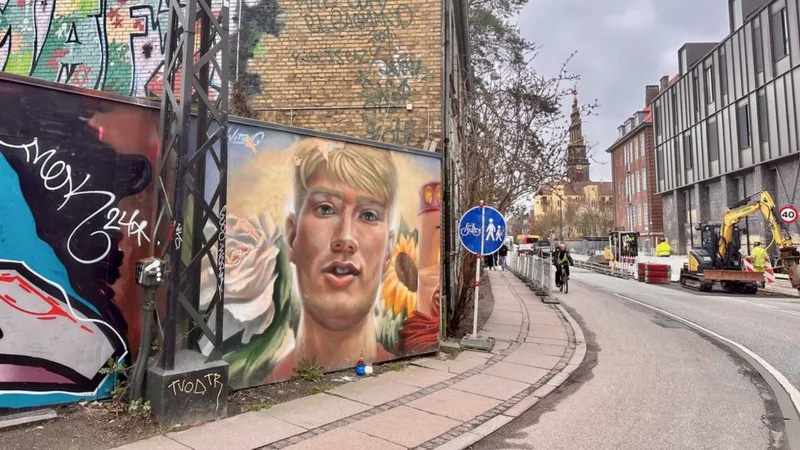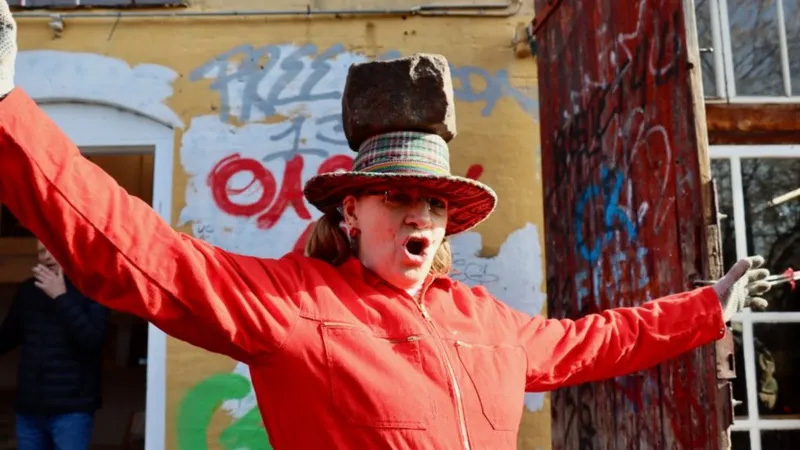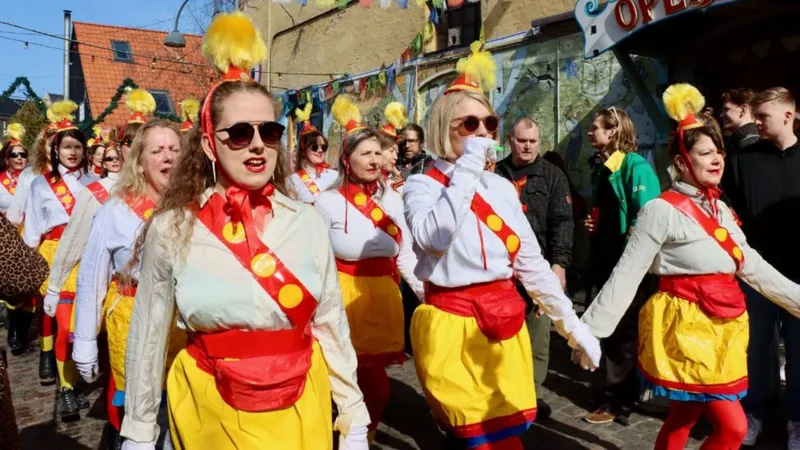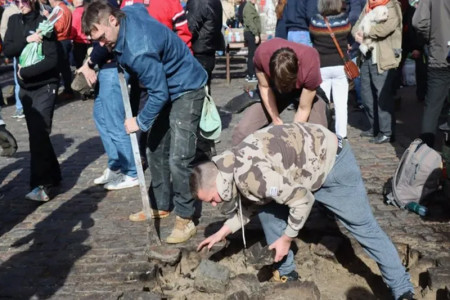Popular with tourists, it is known for its liberal attitude towards cannabis and the infamous drug market, Pusher Street.
However, in recent years organised criminals have increasingly taken over, and growing violence has rattled the community.
Residents have now had enough. In a bid to reclaim the street from drug dealers, this Saturday they began physically digging it up, armed with spades and crowbars.
There were celebratory claps and cheers of "Christiania", as locals prised up heavy cobblestones and tossed them into wheelbarrows, one by one.
"We've been breaking up Pusher Street. It's closing down today. So it's a kind of a closing party," said local Pia Jagger, carrying away a big stone.
Now this roughly 100-metre stretch of road has a new sign reading: "Pusher Street is closed today."
"In the last five or six years I haven't been here that much because I have kids and I didn't feel very safe," said onlooker Sofie Ostergaard. "Today I brought all three of them, and they're helping."
Standing beside a rainbow-coloured cargo bike, 40-year resident Hulda Mader told the BBC: "It feels like a historic moment. We're very happy for it."
A spokeswoman for Christiania's press group, she said: "We are very tired of people saying Pusher Street is Christiania. It is not."
Though it's illegal in Denmark, cannabis has been sold openly in Christiania for decades.

A mural has been painted remembering one person who was shot dead in the area
But many of the original local dealers have been pushed out, as organised gangs have wrested control. In the last three years, there has been a spate of stabbings and fatal shootings.
According to Ms Mader, the community reached a turning point about a year-and-a-half ago.
"Two people came in," she said. "They shot one dead and injured four others. That was absolutely where we said this is enough."
"We're going to dig it up. We're gonna change all the infrastructure. Then we're gonna start building other stuff."
"For us hash is not the problem, it's the money in it," Mette Prag, a representative from the Freetown Christiania Foundation, told reporters.
"But the last years with all the violence and all the fighting, we cannot have it in our society. That's why now this chapter must come to an end."
Among those present on Saturday was Danish Justice Minister Peter Hummelgaard.
"It is a day that is the beginning of the end, of the very, very deep roots that organised crime gangs have established in this neighbourhood in Copenhagen," he said.
"To safeguard that Christiania will continue to be a vibrant, colourful, creative part of Denmark, it needs to be a place without organised criminal gangs."
Tourists are still welcome to visit Christiania, he added, but not for drugs.

Cobblestones were dug up by locals during the day
Ordinarily this T-shaped strip is the epicentre of Denmark's cannabis trade, where so-called pushers hawk weed from behind makeshift stacks of beer crates and plywood market stalls, labelled with names like Green Rocket and Blue Dream. Just three days ago, the BBC counted roughly 20 sellers.
Until the late 1990s it was informally tolerated, says Kim Moeller, a professor of criminology at Malmo University. But that ended in the 2000s, as the market grew bigger and more visible.
He says about five different gangs now operate, and that has brought more disputes.
"If you have a conflict between groups in Copenhagen, they can most likely find each other in Pusher Street where they can shoot at each other," says Deputy Police Inspector Simon Hansen, who oversees the Copenhagen police force's operation in Christiania.
It is often the people manning these shops who get caught up, he says. "They are sometimes kids. Sometimes people who have some kind of disability, and people who can't get a job."
Police have repeatedly raided Pusher Street but the dealers have kept coming back.
"We clear out the shops 100 times a year", Mr Hansen said. "That sounds like pushing the same rock up a mountain. But we don't want the shops to evolve to small houses and sheds."
'Perfect hippy dream'
Found within a kilometre of the Danish parliament, Freetown Christiania was established in 1971 when a bunch of anarchists and hippies squatted inside a vacant military base.
They set up an independent commune, with its owns rules and flag. There is no leader and decisions are made by consensus at communal meetings. The Danish state eventually accepted Christiania as a radical "social experiment", later giving it legal status.
Local gallery owner Marios Orozco moved here from the USA in 1981, when he was 19.
"I had long hair and found Christiania to be the perfect hippy dream," he told the BBC.
"You can imagine a village filled with people that didn't fit into society. There were bikers, hippies and nudists running around. It was sort of a chaotic piece of heaven."
Today 1,000 residents, including 250 children, live in the graffiti-covered barracks and wooden cottages along Copenhagen's historic ramparts. With music venues, vegetarian cafes and souvenir shops, it's also one of the country's top tourist destinations.
Christiania has often been at loggerheads with the authorities, and for a long time it resisted efforts to shut down Pusher Street. But last August residents agreed it must go.
In an extraordinary shift, they collaborated for several months with Copenhagen's Lord Mayor Sophie Haestorp Andersen, Justice Minister Hummelgaard and police over a new plan.
"As a city, we cannot live with [the violence], and the local Christianites have not been able to live with it either, but had been afraid to do something radically about it," said the mayor. "I told them I would back them up. Now we have a plan and we're taking the first step."

Saturday's celebrations are not the first time Christianites have tried to kick out the gangs
It's not the first time Christianites have tried to keep the gangs out. Last August Pusher Street was blockaded with shipping containers and concrete blocks. But the dealers soon returned.
And Mr Orozco is among those who are sceptical that Saturday's initiative will work.
"If this does eventually succeed and they manage to disperse [the dealers], they won't be in one area, there'll be many areas," he says.
The question of the dealers spilling over into the rest of Copenhagen is something that has often been discussed.
"We don't try to let anyone get the idea that this will kill off the illegal drugs market," said Mr Hummelgaard.
"The police themselves, they assess that they will have an easier job combating the illegal drug trade and crimes related to that, if it's not all concentrated."
More than five decades after its creation, the commune still survives, though its future faces more uncertainty.
Besides shuttering Pusher Street, new plans to revitalise the area include a large social housing development. But others fear it will hurt the commune's identity.
"They want to build 300 apartments," said Mr Orozco. "It's going to just destroy the vibe of this place."
New arts spaces, playgrounds and shops are among the ideas for what might eventually replace Pusher Street. "We will reboot the workplaces, the culture places," said Mette Prag.
But also on the cards is potentially a new name for the street.
By Adrienne Murray


